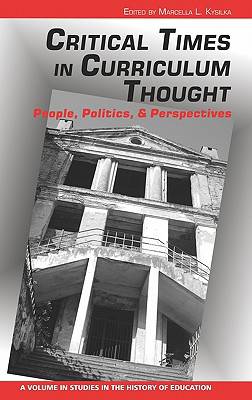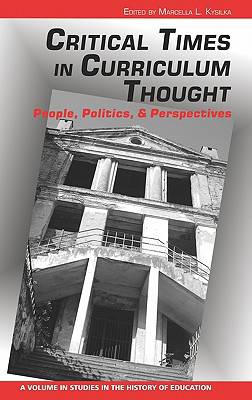
- Afhalen na 1 uur in een winkel met voorraad
- In januari gratis thuislevering in België
- Ruim aanbod met 7 miljoen producten
- Afhalen na 1 uur in een winkel met voorraad
- In januari gratis thuislevering in België
- Ruim aanbod met 7 miljoen producten
Critical Times in Curriculum Thought
People, Politics, and Perspectives (Hc)
Omschrijving
This book is designed to be used at a master's level for a degree in curriculum and instruction, teacher education or educational leadership. It could be used as a primary or a supplementary text. The book is divided into three parts: The first section focuses on the contributions of noted educators to the field of education: Florence Stratemeyer, (Haberman and Corrigan) Hilda Taba (Barbara Stern), Alice Miel (Jennifer Deets), Booker T. Washington (Karen Riley), Ralph Tyler (Gerald Ponder and Dixie Massey) and John Dewey (William Schubert and Heidi Schubert). The authors of these chapters focused on contributions that were "less: known, but particularly important in thinking about education. The second section of the book focuses on curriculum movements that were politically motivated and their impact on curriculum applications in the schools: Cold War/Sputnik (Peggy Moch), Civil Rights (William Ayers), Women's Rights (Susan Brown), Bilingual/multicultural education (Gloria Contreras and Ron Wilhelm), and the growing economic divide (William Watkins). The last section of the book provides perspectives on factors that affected curriculum implementation as seen through the eyes of authors who have done considerable research in these areas: Social Justice (William Gaudelli and Dennis Urban), Integrated Curriculum (Lynne Bailey), The Comprehensive High School (Marcella Kysilka), Technology in the Curriculum (Gretchen Schwarz and Janet Dunlop) and Inclusive Curriculum (Allison Dickey)
The book could be used in Alternative Certification Programs as well as the chapters focus on issues that are common in the public school sector. The chapters are short and meaty and provide a thorough understanding of the people, politics and perspectives of the times.
Specificaties
Betrokkenen
- Uitgeverij:
Inhoud
- Aantal bladzijden:
- 354
- Taal:
- Engels
- Reeks:
Eigenschappen
- Productcode (EAN):
- 9781617352287
- Verschijningsdatum:
- 4/05/2011
- Uitvoering:
- Hardcover
- Formaat:
- Genaaid
- Afmetingen:
- 156 mm x 234 mm
- Gewicht:
- 671 g

Alleen bij Standaard Boekhandel
Beoordelingen
We publiceren alleen reviews die voldoen aan de voorwaarden voor reviews. Bekijk onze voorwaarden voor reviews.








